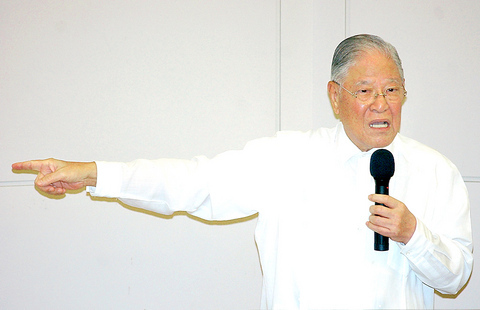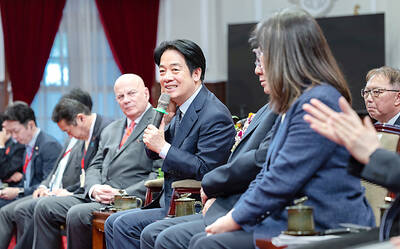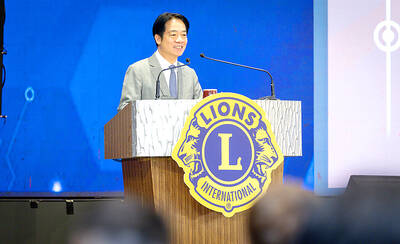Former President Lee Teng-hui (
Implying that Taiwan is under the protection of the US, Lee said it was necessary to procure arms from the US.
"You can't take a bus without paying for it," he said.

PHOTO: LIU HSIN-DE, TAIPEI TIMES
Lee made the remarks yesterday while expressing his opinion about the current international situation to the members of the "Friends of Lee Teng-hui Association," a non-profit organization created to support Lee Teng-hui and his localization policies.
However, a senior US military official told the Taipei Times that it had been standing policy for the US to maintain a "nuclear deterrent," most of which is kept aboard a number of nuclear missile subs that are constantly on patrol worldwide.
The patrols were not specifically directed at China, and the missiles would only be given specific targeting instructions on the order of the US president, the source said.
Still, Lee encouraged the Taiwanese people to remain confident and not to be afraid of China, saying as it is "impossible" for China to attack Taiwan.
"Given the US nuclear submarines patrolling in the Pacific Ocean and all of their equipped nuclear warheads, China can't move at all. It would take at least an army of ten divisions for China to attack Taiwan, which is an impossible mission," Lee told the members.
It is unclear how Lee arrived at his conclusion, given that the People's Liberation Army is usually estimated to have at least 20 infantry divisions, 10 armor divisions, and five mechanized infantry divisions, not including its air, naval and special forces.
Lee said that Beijing was restrained by the US' military deployments, so the best measure China could exert to influence the Taiwanese people was to arrange visits by opposition leaders, Lee said.
These "pro-China" people went to Beijing to shake hands with the Communist leaders and to bow to the Chinese authorities because they couldn't accept the fact that Chen Shui-bian (
"They should be blamed for their anti-democratic attitude. Actually, they are considered by many people in China as `fools,' but they don't know that. Ironically, they even tried to scare the Taiwanese people, because they wanted the people to listen to them," Lee said.
Lee reiterated that China is nothing to be afraid of. Instead, Taiwan should be cautious about these "pro-China" people who have tried to cheat Taiwanese people time and again, Lee said.
Despite his confidence about cross-strait security, Lee said that Taiwan can't pretend it cares nothing about arms procurement if it wishes to maintain relations with the US.
A special arms procurement budget bill worth NT$480 billion (US$15 billion) has been stuck in the legislature because of opposition from the pan-blue alliance.
"The new development of Chinese Nationalist Party (KMT) chairman-elect Ma Ying-jeou (馬英九) being invited to visit Washington means that the US wants to preach to him the importance of the arms procurement package," Lee said.
In his wide-ranging comments, Lee also leveled criticism at the government's cross-strait policies.
"If the Executive Yuan decides to include Penghu into the scope of the small three links, I will stage a march against the government. I will oppose this policy to the end," Lee said.
The "small three links" refer to cargo, passenger and postal links between Kinmen and Xiamen, and Matsu and Mawei.
Lee's criticism came in the wake of the report by a Chinese-language newspaper last week that Penghu County could be approved to serve as another transit port between the two sides of the Strait, just like Kinmen and Matsu under the small three links policy, which took effect in 2001.
The government, however, has already responded to the report, saying that it is not true.
"Penghu will still be subject to special regulations under the renewed small three links scheme, which means that only special cases approved by the government can be allowed to travel from Taiwan via Penghu to China," Johnnason Liu (劉德勳), vice chairman of the Mainland Affairs Council was quoted as saying.
Liu said that the government might allow a commercial group to leave for China via Penghu in this September, but that the government was not prepared to let Penghu take on the general transit role.
Additional reporting by Mac William Bishop

Two US House of Representatives committees yesterday condemned China’s attempt to orchestrate a crash involving Vice President Hsiao Bi-khim’s (蕭美琴) car when she visited the Czech Republic last year as vice president-elect. Czech local media in March last year reported that a Chinese diplomat had run a red light while following Hsiao’s car from the airport, and Czech intelligence last week told local media that Chinese diplomats and agents had also planned to stage a demonstrative car collision. Hsiao on Saturday shared a Reuters news report on the incident through her account on social media platform X and wrote: “I

‘BUILDING PARTNERSHIPS’: The US military’s aim is to continue to make any potential Chinese invasion more difficult than it already is, US General Ronald Clark said The likelihood of China invading Taiwan without contest is “very, very small” because the Taiwan Strait is under constant surveillance by multiple countries, a US general has said. General Ronald Clark, commanding officer of US Army Pacific (USARPAC), the US Army’s largest service component command, made the remarks during a dialogue hosted on Friday by Washington-based think tank the Center for Strategic and International Studies. Asked by the event host what the Chinese military has learned from its US counterpart over the years, Clark said that the first lesson is that the skill and will of US service members are “unmatched.” The second

STANDING TOGETHER: Amid China’s increasingly aggressive activities, nations must join forces in detecting and dealing with incursions, a Taiwanese official said Two senior Philippine officials and one former official yesterday attended the Taiwan International Ocean Forum in Taipei, the first high-level visit since the Philippines in April lifted a ban on such travel to Taiwan. The Ocean Affairs Council hosted the two-day event at the National Taiwan University Hospital International Convention Center. Philippine Navy spokesman Rear Admiral Roy Vincent Trinidad, Coast Guard spokesman Grand Commodore Jay Tarriela and former Philippine Presidential Communications Office assistant secretary Michel del Rosario participated in the forum. More than 100 officials, experts and entrepreneurs from 15 nations participated in the forum, which included discussions on countering China’s hybrid warfare

MORE DEMOCRACY: The only solution to Taiwan’s current democratic issues involves more democracy, including Constitutional Court rulings and citizens exercising their civil rights , Lai said The People’s Republic of China (PRC) is not the “motherland” of the Republic of China (ROC) and has never owned Taiwan, President William Lai (賴清德) said yesterday. The speech was the third in a series of 10 that Lai is scheduled to deliver across Taiwan. Taiwan is facing external threats from China, Lai said at a Lions Clubs International banquet in Hsinchu. For example, on June 21 the army detected 12 Chinese aircraft, eight of which entered Taiwanese waters, as well as six Chinese warships that remained in the waters around Taiwan, he said. Beyond military and political intimidation, Taiwan